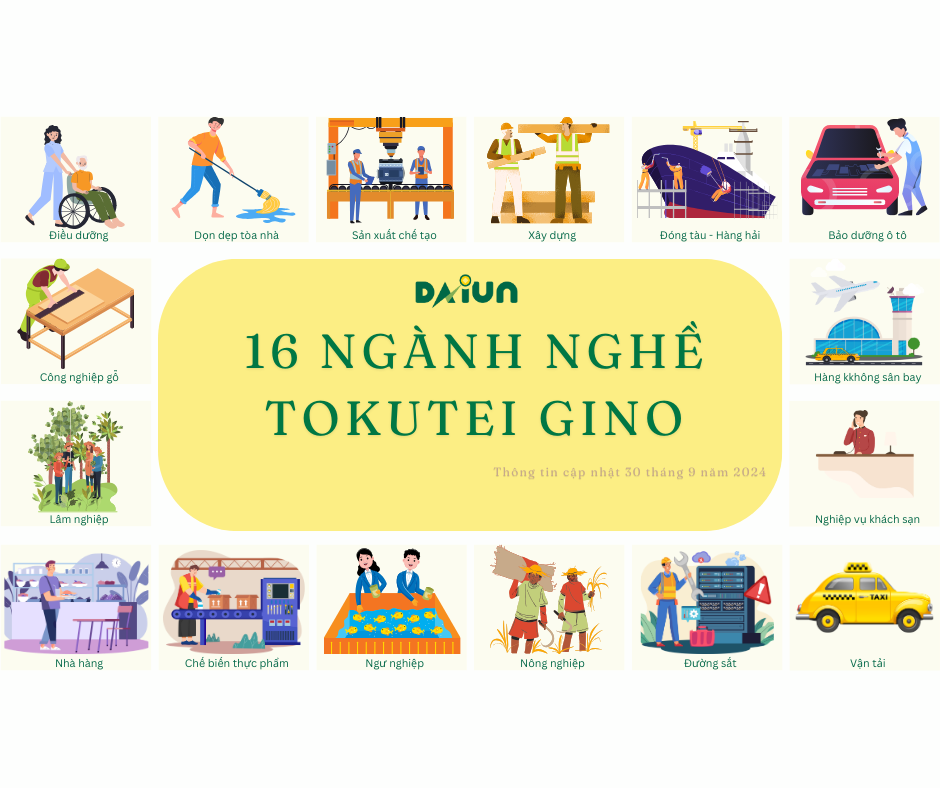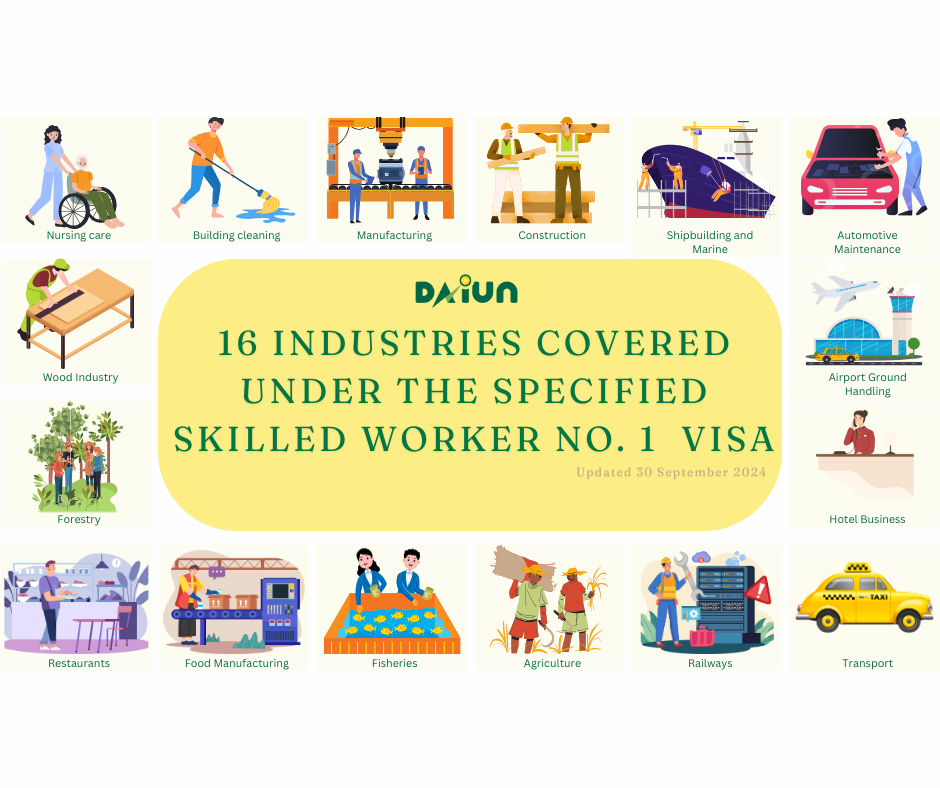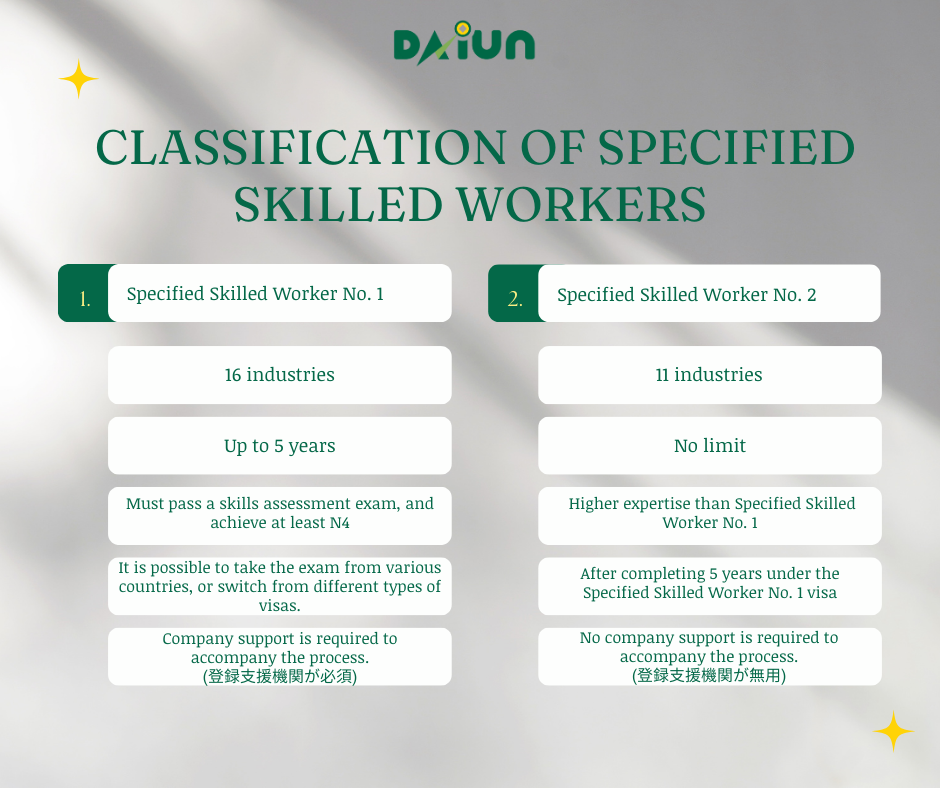
Overview of the Specified Skilled Worker System in Japan
The Specified Skilled Worker system (特定技能, Tokutei Ginou) is one of Japan's new immigration policies, implemented in April 2019 to address the severe labor shortage in many industries. This system is specifically designed for foreign workers with skills and work experience in specific industries. In this article, we will delve into the key aspects of the Specified Skilled Worker system, including its origin, classification, participation requirements, benefits, obligations, and the challenges faced by both workers and businesses.
1. The Origin of the Specified Skilled Worker System
Japan is an economically developed nation, but an aging and declining population has led to a severe labor shortage. The Japanese government has implemented various measures to attract foreign workers from various countries such as Vietnam, the Philippines, Indonesia, Nepal, and others. In this context, the Specified Skilled Worker system was introduced to open immigration doors for skilled foreign workers, not only focusing on temporary jobs but also allowing them to work long-term and stably in Japan.
Before the Specified Skilled Worker system was implemented, Japan already had other labor programs, such as the Technical Intern Training Program (技能実習, Ginou Jisshuu). However, this program faced criticism for its shortcomings, such as short labor terms, workers not being allowed to switch jobs, and workers' rights not being adequately protected. The Specified Skilled Worker system was introduced to address these issues and to meet the demand for skilled labor in Japanese businesses.

2. Classification of Specified Skilled Workers
The Specified Skilled Worker system is divided into two categories: Specified Skilled Worker No. 1 (特定技能1号, Tokutei Ginou 1-gou) and Specified Skilled Worker No. 2 (特定技能2号, Tokutei Ginou 2-gou). Both categories have different conditions and requirements, as follows:
2.1. Specified Skilled Worker No. 1
- Industries: This category covers 16 industries, including Nursing Care, Building Cleaning, Manufacturing, Construction, Shipbuilding and Marine, Automotive Maintenance, Airport Ground Handling, Hotel Business, Logistics, Railways, Agriculture, Fisheries, Food and Beverage Manufacturing, Restaurants, Forestry, and the Wood Industry.
- Visa Duration: Up to 5 years, with possible renewals of 1 year, 6 months, or 4 months, depending on the case.
- Skill Requirements: Workers must pass a skills assessment exam (held in several countries, including Vietnam) and achieve a Japanese language proficiency level of at least N4 (basic communication level).
- Benefits: Workers receive wages comparable to Japanese workers of the same skill level and are entitled to social insurance, similar to domestic workers.
- Restrictions: Workers are not allowed to bring their families during their stay in Japan.
2.2. Specified Skilled Worker No. 2
-
Industries: Currently, this category is limited to 11 industries.
-
Visa Duration: There is no limit on the duration of stay, and workers can renew their visas multiple times, with the opportunity to apply for long-term residency in Japan.
-
Skill Requirements: This category requires higher expertise than Specified Skilled Worker No. 1, meaning workers must pass a more advanced skills assessment.
- Benefits: Workers in this category can bring their families to Japan and settle there long-term.

3. Requirements for Participation in the Specified Skilled Worker System
3.1. For Specified Skilled Worker No. 1
- Age: Workers must be 18 years or older.
- Education: No specific educational background is required, but workers must have relevant work experience or have completed the Technical Intern Training Program.
- Exams: Workers must pass both a skills assessment exam and a Japanese language proficiency test (JLPT or equivalent exams).
- Technical Intern Trainees: Those who have completed the Technical Intern Training Program can switch to a Specified Skilled Worker visa without needing to retake the skills assessment exam.
3.2. For Specified Skilled Worker No. 2
- Experience: Workers must have several years of experience in their field and pass a more advanced professional skills assessment.
- Specified Skilled Worker No. 1: After completing 5 years of work under a Specified Skilled Worker No. 1 visa, workers can apply to switch to a Specified Skilled Worker No. 2 visa.
4. Rights and Obligations of Workers
4.1. Rights
- Wages: Workers under the Specified Skilled Worker system receive wages comparable to Japanese workers in the same position and skill level.
- Insurance: Workers are entitled to participate in social insurance programs, including health insurance, pension insurance, unemployment insurance, and workers' compensation.
- Work Hours: Workers must follow Japan's legal work hours, with a maximum of 40 hours per week and access to paid leave and public holidays as required by law.
- Career Development: Specified Skilled Worker No. 2 visa holders have the opportunity to bring their families and apply for permanent residency in Japan if they meet the required conditions.
4.2. Obligations
- Compliance with the Law: Workers must comply with Japanese law, particularly regarding labor, residency, and taxes.
- Professional Conduct: Workers must work in the specific field registered in their visa and are not allowed to change jobs arbitrarily.
- Financial Obligations: Workers are responsible for fulfilling their financial obligations, including income taxes and social insurance contributions.
5. Challenges and Opportunities
5.1. Challenges
- Language Barriers: Although only basic Japanese proficiency (N4) is required, many workers face difficulties in communication and understanding their rights.
- Support from Businesses: Some Japanese businesses lack experience in managing foreign workers, resulting in inadequate support for them.
- Social Integration: Foreign workers often struggle to integrate into Japanese society due to cultural and social differences.
5.2. Opportunities
- Skill Development: The Specified Skilled Worker system provides workers with the opportunity to enhance their skills and gain work experience in a professional environment.
- Long-term Residency: With a Specified Skilled Worker No. 2 visa, workers can bring their families and apply for permanent residency in Japan, opening up long-term development opportunities.
6. The Future of the Specified Skilled Worker System
The Specified Skilled Worker system plays a crucial role in Japan's immigration policy amid labor shortages and an aging population. The Japanese government is expected to continue expanding industries and improving working conditions for foreign workers. At the same time, increased support from businesses and communities will help foreign workers integrate more smoothly into Japanese society.
In conclusion, the Specified Skilled Worker system not only brings significant benefits to both foreign workers and Japanese businesses but also contributes to solving labor shortages and promoting Japan's economic development. However, to fully take advantage of the opportunities this system offers, efforts are required from the government, businesses, and workers alike.




 Tại Nhật Bản.jpg)